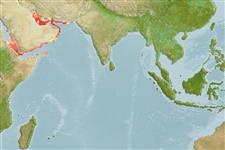ກຸ່ມປາກະດູກອ່ອນ (ເຊັ່ນ: ປາສະຫລາມ, ປາຜາໄລ) (sharks and rays) >
Rhinopristiformes (Shovelnose rays) >
Rhinobatidae (Guitarfishes)
Etymology: Rhinobatos: Greek, rhinos = nose + Greek, batis, -idos = a ray (Raja sp.) (Ref. 45335).
More on authors: Compagno & Randall.
Environment: milieu / climate zone / depth range / distribution range
ນິເວດວິທະຍາ
ສັດທະເລ ກ່ຽວກັບ (ຢູ່)ເທິງຊັ້ນພື້ນດິນໃນທະເລເປີດ; ລະດັບຄວາມເລິກ 70 - 150 m (Ref. 100719). Tropical; 29°N - 12°N, 32°E - 66°E (Ref. 114953)
Western Indian Ocean: Gulf of Aqaba, Gulf of Suez, Red Sea, Muscat (Oman) to Pakistan.
ຂະໜາດ / ນ້ຳໜັກ / Age
Maturity: Lm ? range ? - ? cm
Max length : 88.9 cm TL ຕົວຜູ້/ບໍ່ມີເພດ; (Ref. 123963)
This species is distinguished by the following set of characters: disc wedge-shaped, its width 29-34% TL, length 1.2-1.3 times width; snout is relatively short, its length 2.2-2.6 times interspiracular distance, 3.6-3.9 times interorbital width in large males (2.9-3.4 in females); orbit diameter 1.2-1.7 times the spiracle length; nostrils are weakly oblique, their length 1.3-1.9 times internarial distance; mouth is narrow, its width 5.4-5.6% TL in large males (5.8-6.2% in females); posterior nasal flaps are broad; two spiracular folds, with outermost fold slightly taller than inner fold; ridges of rostral cartilage almost parallel, converging slightly anteriorly but not constricted medially; anterior cartilage subtriangular to sickle-shaped, usually blunt posteriorly; distance between fifth gill slits 2.8-3.1 times in ventral head length in large males (2.5-2.6 in females); prebranchial sensory pore patch distinct, extending to outer margin of first gill slit; postscapular sensory canal usually distinct, notched, with exposed lateral pores; inconspicuous thorn patches on the supraorbit and scapular region, with a single row along dorsal midline rudimentary; denticles are confined to anterior portion of dorsal fins, posterior two-thirds naked; dorsal fins are relatively tall, height of first 7.6-9.5% TL; pelvic-fin inner margin shorter than its base length; interdorsal distance 2.1-2.7 times first dorsal-fin base; dorsal caudal margin 2.1-2.2 times the preventral margin; upper jaw with ~76 tooth rows; snout angle 60-75°; pectoral radials 69-75; post-synarcual centra 175-184; nasal lamellae ~59, Colouration: dorsal highly variable, plain brownish to greenish brown, faintly or strongly marked with small white spots, ocellated, or with a combination of reticulations and ocelli; the posterior half of dorsal and caudal fins usually dusky or blackish; snout with a pale or dusky tip, no long teardrop-shaped marking (Ref. 123963).
Demersal inshore on continental shelf to 70 m depth. Feeds on small crustaceans and fishes. Matures at ca. 62 cm TL; born at ca. 25 cm TL (Ref. 114953). Ovoviviparous (Ref. 50449). Produces litters of up to 7 pups (Ref. 114953).
Life cycle and mating behavior
Maturities | ການສືບພັນ | Spawnings | Egg(s) | Fecundities | ຕົວອ່ອນ
Exhibit ovoviparity (aplacental viviparity), with embryos feeding initially on yolk, then receiving additional nourishment from the mother by indirect absorption of uterine fluid enriched with mucus, fat or protein through specialised structures (Ref. 50449).
Randall, J.E. and L.J.V. Compagno, 1995. A review of the guitarfishes of the genus Rhinobatos (Rajiformes: Rhinobatidae) from Oman, with description of a new species. Raffles Bull. Zool. 43(2):289-298. (Ref. 11293)
IUCN Red List Status (Ref. 130435)
Threat to humans
Harmless
Human uses
ເຄື່ອງມື
Special reports
Download XML
ແຫຼ່ງອີນເຕີເນັດ
Estimates based on models
Preferred temperature (Ref.
123201): 22.9 - 28.5, mean 26.4 °C (based on 364 cells).
Phylogenetic diversity index (Ref.
82804): PD
50 = 0.5000 [Uniqueness, from 0.5 = low to 2.0 = high].
Bayesian length-weight: a=0.00195 (0.00126 - 0.00301), b=3.13 (3.00 - 3.26), in cm total length, based on LWR estimates for this species & (Sub)family-body (Ref.
93245).
ຊັ້ນເຂດຮ້ອນ (Ref.
69278): 3.7 ±0.4 se; based on size and trophs of closest relatives
ຄວາມຢືດຢຸ່ນ (Ref.
120179): ຕຳ່, ປະຊາກອນຕຳ່ສຸດທີ່ໃຊ້ເວລາສອງເທົ່າ 4.5 - 14 ປີ (Fec assumed to be <100).
Fishing Vulnerability (Ref.
59153): High vulnerability (56 of 100).
